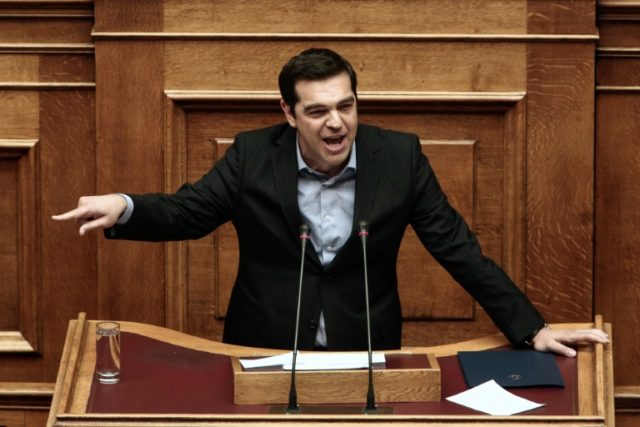Brussels (AFP) – Eurozone finance ministers on Monday gave themselves until May 24 to reach a divisive deal on debt relief for Greece after lawmakers in Athens adopted tough reforms demanded as part of the country’s bailout.
The 19 ministers meeting in Brussels aimed to finally sign off on the long-delayed first review of last July’s 86-billion-euro ($95 billion) EU-IMF bailout — cash-strapped Greece’s third in five years.
The ministers hailed the progress made by leftist-led Athens, but expressed doubt that any major breakthrough would be reached at the talks, especially on the thorny subject of debt relief.
The government of Prime Minister Alexis Tsipras is eager to win the green light from its creditors to unlock much needed cash from the bailout to avoid defaulting on huge debt payments this July.
“Today we are having a first discussion on the topic and then we will cut the knot on May 24,” Eurogroup head Jeroen Dijsselbloem said as he arrived for the talks in unseasonably warm Brussels.
“The Germans are reticent, we will discuss that with them,” added Dijsselbloem, who is also Dutch finance minister.
The fresh delay comes amid persistent divisions between the eurozone and the International Monetary Fund, which has threatened to pull ou of the bailout if Greece does not get relief for its huge mountain of debt.
– Germany’s Schaeuble ‘confident’ –
German Finance Minister Wolfgang Schaeuble, the Eurogroup’s most influential member, was optimistic of a deal this month despite his own strong opposition to debt relief.
“I think we will make good progress today… I am still confident to find a solution in May,” said Schaeuble ahead of the talks, athough he said that closer scrutiny was needed of the possibility of debt relief.
Finland’s finance minister Alexander Stubb, who has frequently taken a hard line on Greece, said “we shouldn’t be expecting miracles today”.
Slovakia’s Peter Kazimir said howevever that “for now, I’m not having a deja vu of last year’s marathon talks on Greece” when the bailout negotiations almost led to Athens crashing out of the euro.
Greece is on the hook to repay big loans to the European Central Bank (ECB) and IMF in July, and has already fallen behind paying for everyday government duties and public sector wages.
On the eve of the talks rioters in Athens hurled petrol bombs and police fired tear gas as tens of thousands of Greeks took to the streets in protest at the tax hikes and pension reforms approved by parliament.
“I really hope today we will set the framework for a global deal… On reforms, a lot has been done,” said the EU’s Economic Affairs Commissioner Pierre Moscovici.
– ‘Failed state’ warning –
But on the table in Brussels is a demand to Athens for a plan for extra reforms that will kick in in case it misses its spending targets in 2018.
These so-called “contingency measures” are a key requirement of the IMF, which is sceptical Athens will meet the targets, but the EU is not keen on them and Greece fiercely opposes further reforms.
IMF chief Christine Lagarde has warned that there were “significant gaps” in Greece’s reform offers, while also accusing the Europeans of demanding unrealistic targets from Athens, and saying debt relief is needed.
Greek Finance Minister Euclid Tsakalotos warned of a “failed state” if the Brussels talks run aground.
The meeting follows days of protests in Greece, where tens of thousands took to the streets to slam the unpopular reforms adopted late Sunday which reduce Greece’s highest pensions and raise taxes.
The measures were passed thanks to the government’s slim majority in the 300-seat parliament, with the government’s far-left Syriza voting in favour of the measures despite fears of dissensions.
In the run-up to the vote, angry unions staged a general strike that paralysed public transport, while some 26,000 people took to the streets of Athens and Greece’s second city Thessaloniki.
Greek Prime Minister Alexis Tsipras, who has said reform is needed to prevent the pension system collapsing, defended the changes in parliament Sunday.
“The system requires root-and-branch reform that previous governments have not dared to undertake,” Tsipras told lawmakers.

COMMENTS
Please let us know if you're having issues with commenting.